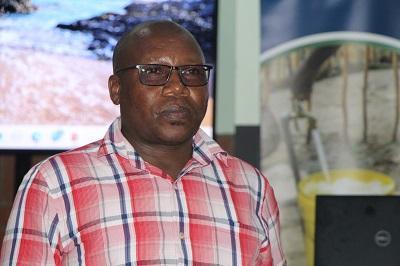Africa-Press – Lesotho. In commemoration of International Water Day, the Ministry of Natural Resources, through the Lesotho Lowlands Water Development Project (LLWDP), hosted a Water Sector Year-End Coordination Meeting. The event served as a reflective forum to discuss achievements and challenges in water resource management while forging strategies for sustainable development in the sector.
This initiative underscored the ministry’s steadfast commitment to fostering collaboration among stakeholders and ensuring the effective management of one of Lesotho’s most precious assets, its water resources. The meeting brought together government officials, water sector professionals, and stakeholders to exchange insights, evaluate progress, and align efforts toward the realisation of Lesotho’s water sustainability goals.
Delivering the keynote address, Hon. Mohlomi Moleko, Minister of Natural Resources, emphasised the significance of World Water Day 2025, themed “Glacier Preservation.” Minister Moleko remarked, “It is both an honor and a responsibility to commemorate this day. Since 1993, the United Nations has designated March 22nd as World Water Day, and as a UN member state, Lesotho proudly joins in observing this important occasion.”
The minister acknowledged the pressing impacts of climate change, particularly for mountainous nations like Lesotho. “Rising temperatures and erratic weather patterns threaten our water security and biodiversity. Glacier preservation is not only about protecting distant ice masses, it is about securing water for all, mitigating disaster risks, and building a sustainable future,” he explained.
Minister Moleko called for collective action, urging stakeholders and citizens alike to prioritise glacier preservation within climate action strategies. He concluded with a powerful call to arms, “Let us seize this day as a reminder that water is life. By reducing carbon emissions, protecting critical water sources, and bolstering climate resilience, we can ensure a world where water remains plentiful for generations to come.”
The Commissioner of Water, Mr. Lebohang Maseru, reflected on the progress and hurdles encountered by the LLWDP since its inception. He noted, “Water plays an indispensable role in Lesotho’s socio-economic development, underpinning agriculture, industry, and daily life. Effective water management is vital for securing food, driving economic growth, and safeguarding our environment.”
Progress and Challenges of LLWDP Phase I
Phase I of the LLWDP, initiated in 2013 and operational since 2015, has significantly improved water infrastructure in Maseru and Berea through the Metolong Dam and Water Supply Program. Phase 1 Project Coordinator, Thabiso Tšasane, highlighted its success in delivering reliable water access to households and businesses, thereby improving quality of life and enhancing economic activity.
However, Tšasane acknowledged obstacles that impacted the project’s timeline, particularly delays in fund disbursement from banks, which affected the pace of implementation. Despite these setbacks, efforts are underway to secure funding for subsequent phases, with an additional focus on raising climate change awareness in communities around Metolong.
Phase II Goals and Future Outlook
Looking ahead, Phase II of the LLWDP aims to build on earlier achievements by advancing bulk water production infrastructure and establishing efficient distribution networks. Phase II Project Manager, Lechobore Nena, elaborated on upcoming initiatives, which include, addressing and raising awareness on climate change.
Nena expressed optimism about the project’s impact, emphasising its potential to meet growing water demands while promoting sustainable resource management practices.
The meeting concluded with a renewed pledge from all stakeholders to place water preservation and climate resilience at the forefront of national development efforts.
For More News And Analysis About Lesotho Follow Africa-Press






